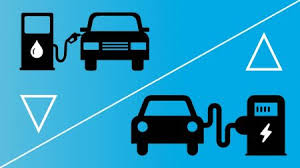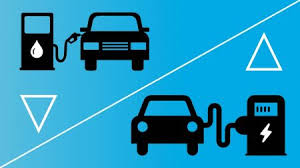
Driven by Advances in battery technology and the growth of autonomous driving and ride sharing - suited to electric vehicles, many carmakers are predicting a significant shift to electric vehicles in the next decade.
But up to 2040, electricity will play only a bit part in transport, predict some oil executives. However if these executives are wrong, it would be cost an industry where new projects often cost billions of dollars to build and need decades, a large cost as over half of all crude oil pumped is used for transport.
The threat posed to the oil industry by electric vehicles is not significant, believes ENI SpA Chief Executive Claudio Descalzi.
"Electric cars, they can grow, but I don’t think that is a problem (for us)," Descalzi told Reuters on the sidelines of a conference in London last month.
Plug-in hybrids – cars with a backup combustion engine for when the battery runs flat or electric vehicles (EVs) would constitute only less than 10 percent of the new vehicles by 2-35, according to oil market outlooks to 2035 and 2040 published by ExxonMobil Corp , the largest western oil producer by market value, and British rival BP Plc respectively.
"Our central view in the outlook is the penetration of electric vehicles and electricity more generally is likely to be pretty limited over the next 20 years," Spencer Dale, BP’s Chief Economist, said in February.
His goal was to have EVs make up between 15 and 25 percent of group global sales by 2025, said Dieter Zetsche, CEO of Mercedes Benz manufacturer Daimler AG, in September.
The same would be done by BMW AG. By 2020, 40 percent of models would be electrified, Ford CEO Mark Fields said in April.
"For over 100 years the internal combustion engine has been a basic design assumption for our business, for our industry," Hau Thai-Tang, Ford vice President for Purchasing told analysts at an investor day in September. "This shift to electrification is game changing," he added.
Alex Griffiths, Group Credit Officer for corporates at credit rating agency Fitch, who produced a report about electric vehicles said that for the oil companies, a lot is riding on the accuracy of their demand forecasts.
"Without that (oil) demand increase, you potentially find that the market gets out of kilter… which is not a good place for the oil industry to be in," he said.
Carmakers expect batteries to be able to support greater vehicle range than some oil companies have predicted and become cheaper.
Many of the big carmakers predict the technology could change their business model from selling vehicles to providing transport as a service.
That would be a big boost for electric engines. While the operating costs of electric cars are much lower than gasoline, they are expected to remain more expensive than combustion engine vehicles for the foreseeable future.
But if the vehicle is part of an autonomous fleet with a high utilization rate – as ride hailers, that extra cost can be quickly recouped.
an expectation that increased car ownership in emerging markets can more than make up for any increase in EV penetration is the basis of oil executives’ outlook for oil.
"When we talk of electric cars, we are talking about the OECD. More than 1.3 billion (people) have no electricity," ENI's Descalzi said, referring to the group of 35 largely rich industrialized nations.
But there was a risk that developing countries' adoption of the automobile echoed their experience with telecoms, said Simon Redmond, Director, Oil & Gas Corporate Ratings at credit rating agency Standard & Poors. In that case, consumers went straight to the latest technology – mobile phones and largely skipped use of the established technology - fixed land lines.
"We believe that China is going to lead in the penetration of electric vehicles into the market," Mary Barra, General Motors CEO, said in October.
Exxon predicts that by 2040, car ownership in China will triple to about 30 vehicles per 1,000 people. China will overtake the United States to become the world’s largest liquids consumer in 2032 due to an increase in miles driven per vehicle over the next 20 years, BP predicts.
Yet, helped by government subsidies worth up to $10,000 per car and exemptions from traffic restrictions in cities such as Beijing and Shanghai, China is already the largest market for electric vehicles in the world.
"The key risk for the industry is the rate of change,” said Redmond. “It does bring into question some of the economics of the different type of projects that the (oil) majors may want to look at," he added.
(Source:www.reuters.com)
But up to 2040, electricity will play only a bit part in transport, predict some oil executives. However if these executives are wrong, it would be cost an industry where new projects often cost billions of dollars to build and need decades, a large cost as over half of all crude oil pumped is used for transport.
The threat posed to the oil industry by electric vehicles is not significant, believes ENI SpA Chief Executive Claudio Descalzi.
"Electric cars, they can grow, but I don’t think that is a problem (for us)," Descalzi told Reuters on the sidelines of a conference in London last month.
Plug-in hybrids – cars with a backup combustion engine for when the battery runs flat or electric vehicles (EVs) would constitute only less than 10 percent of the new vehicles by 2-35, according to oil market outlooks to 2035 and 2040 published by ExxonMobil Corp , the largest western oil producer by market value, and British rival BP Plc respectively.
"Our central view in the outlook is the penetration of electric vehicles and electricity more generally is likely to be pretty limited over the next 20 years," Spencer Dale, BP’s Chief Economist, said in February.
His goal was to have EVs make up between 15 and 25 percent of group global sales by 2025, said Dieter Zetsche, CEO of Mercedes Benz manufacturer Daimler AG, in September.
The same would be done by BMW AG. By 2020, 40 percent of models would be electrified, Ford CEO Mark Fields said in April.
"For over 100 years the internal combustion engine has been a basic design assumption for our business, for our industry," Hau Thai-Tang, Ford vice President for Purchasing told analysts at an investor day in September. "This shift to electrification is game changing," he added.
Alex Griffiths, Group Credit Officer for corporates at credit rating agency Fitch, who produced a report about electric vehicles said that for the oil companies, a lot is riding on the accuracy of their demand forecasts.
"Without that (oil) demand increase, you potentially find that the market gets out of kilter… which is not a good place for the oil industry to be in," he said.
Carmakers expect batteries to be able to support greater vehicle range than some oil companies have predicted and become cheaper.
Many of the big carmakers predict the technology could change their business model from selling vehicles to providing transport as a service.
That would be a big boost for electric engines. While the operating costs of electric cars are much lower than gasoline, they are expected to remain more expensive than combustion engine vehicles for the foreseeable future.
But if the vehicle is part of an autonomous fleet with a high utilization rate – as ride hailers, that extra cost can be quickly recouped.
an expectation that increased car ownership in emerging markets can more than make up for any increase in EV penetration is the basis of oil executives’ outlook for oil.
"When we talk of electric cars, we are talking about the OECD. More than 1.3 billion (people) have no electricity," ENI's Descalzi said, referring to the group of 35 largely rich industrialized nations.
But there was a risk that developing countries' adoption of the automobile echoed their experience with telecoms, said Simon Redmond, Director, Oil & Gas Corporate Ratings at credit rating agency Standard & Poors. In that case, consumers went straight to the latest technology – mobile phones and largely skipped use of the established technology - fixed land lines.
"We believe that China is going to lead in the penetration of electric vehicles into the market," Mary Barra, General Motors CEO, said in October.
Exxon predicts that by 2040, car ownership in China will triple to about 30 vehicles per 1,000 people. China will overtake the United States to become the world’s largest liquids consumer in 2032 due to an increase in miles driven per vehicle over the next 20 years, BP predicts.
Yet, helped by government subsidies worth up to $10,000 per car and exemptions from traffic restrictions in cities such as Beijing and Shanghai, China is already the largest market for electric vehicles in the world.
"The key risk for the industry is the rate of change,” said Redmond. “It does bring into question some of the economics of the different type of projects that the (oil) majors may want to look at," he added.
(Source:www.reuters.com)














